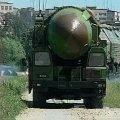How to secure nuclear stockpiles against terrorists will be the focus of the Global Security Summit.
President Barack Obama launched the idea of a summit last year. He outlined his vision during a speech in Prague. "I am announcing a new international effort to secure all vulnerable nuclear material around the world within four years," he said. "We will set new standards, expand our cooperation with Russia, and pursue new partnerships to lock down these sensitive materials." In his speech, President Obama said nuclear terrorists are determined to buy, build or steal nuclear weapons.
The conference will discuss groups like al-Qaida and how to prevent them from obtaining nuclear materials for bombs.
Alexandra Toma is a nuclear security expert with the group Connect U.S. Fund. She says the danger is real. "It's the number one threat to American security today - to American and global security, frankly. We've seen two bi-partisan commissions come out just this January saying al-Qaida has been trying to get nuclear weapons since the 1900s and they are actively continuing to do so," Toma said. The conference is expected to look at improving security for nuclear materials worldwide and increasing international cooperation.
But experts say no-one knows how large the world stockpile of nuclear material is because not every country reports what it's producing. "During the Cold War in particular, the U.S. and Russia produced for military purposes," Ken Luongo said. He heads the research organization Partnership for Global Security. "They didn't report to each other or to any international authority how much. The Pakistanis and the Indians are now very secretive about how much material they produce. We don't know how much the Israelis have produced etc. etc. So we don't have an accurate gauge." Luongo says not every country believes terrorists want to obtain nuclear materials to build a bomb. "A lot of countries are not buying the fact that nuclear terrorism is a high priority. It baffles me, but it's real. And there's a big divide between the view of the United States and some of its key allies and the rest of the world, in particular in the developing world," he added. Analysts say a key goal is to get participants to agree that the threat exists.
But Alexandra Toma wants more concrete results from the gathering. "What we expect to see come out of the summit is a communiqué with an action plan, a specific timeline with very particular benchmarks that are measurable on how to secure and lockdown these vulnerable nuclear materials," she stated. Recently, President Obama and his Russian counterpart Dmitri Medvedev agreed on a new treaty slashing long-range nuclear weapons. Experts believe that action could have a positive effect on the outcome of the meeting on nuclear terrorism.

